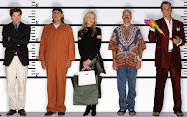
There are two types of reviews. There are what I call "douchebag reviews" where the writers use theoretical analyses to dissect the film (more often than not in pretentious tones), and then there are "entertainment reviews." The former category is for film lovers, people who seek out profound experiences at the cinema. The latter category is for cinephiles, people who just love movies and want to see everything ever made. This review will fall into the former, but if you want a brief entertainment review, here it is: This isn't a good movie. It uses every generic formula for movie-making that you've already seen this film before, many times with many other actors. But did I enjoy myself? Sure. Would I recommend it? Sure. I mean, unless it's Paul Blart: Mall Cop (where, as one critic noted, the director knew how to "put the camera in front of stuff"), I'll probably recommend something just for the experience of it. There were enough "Oh, shit!" moments that I found myself entertained throughout.
But now for the douchebag review...
The dialogue was cringe-inducing. There were a few moments I laughed out loud. In the first fifteen minutes, we got to know everything we need to know about Bryan Mills (Liam Neeson) from the mouths of other people. Among the gems uttered, we learned Mills is good at being invisible, that he doesn't play by the rules, that he has the propensity to worry, and that he would sacrifice anything for his daughter. Gee, can we say blatant foreshadowing? And not only do all of these "flaws" in his character come into play later, they all become good traits of his character. Because he doesn't play by the rules, he saves his daughter. Because he's overly cautious and worries too much, he saves his daughter. It's as though the movie set up his masculinity as a problem -- he lost his wife, he lost his daughter! -- and then these very problems end up redeeming him in the end. This film is a male's fantasy, and it's insulting.
There is nothing "real" about this movie. Most of the online reviews I've read, all written by men, have noted Liam Neeson's age as a site of implausibility. I don't know if it's because I'm female, but I had no problem with his age. I think if you're fit and strong and active, there's nothing implausible about a man beating a bunch of people up. What I do have a problem with, however, are the abundant clichés in the film. There was nothing original about the story. The only thing that makes this movie in the least bit enjoyable is Liam Neeson and his awesome I-will-kill-you voice.
The following clichés can be found in Taken:
1. Women are weak, feeble creatures who do nothing for the plot.* Of course, Liam Neeson is Irish, not American, but in the movie he plays an American, so it's okay when he does it.
2. Arabs -- in this case, Albanians -- are evil and always carry a gun.
3. The dialogue (meaning, the characters) tell you everything you need to know about someone's personality.
4. Car chase scenes involve nothing more than loud music and fast editing.
5. Russians are evil, but not as evil as Arabs.
6. The slutty girl always dies, whereas the virgin does not.
7. Being a seventeen year old girl means acting like a twelve year old girl.
8. Gorgeous women will only marry older, uglier guys -- and if they remarry, it's to older, uglier guys with money.
9. Saying that human trafficking "isn't personal, it was just a business" to the father of one of the girls is a bad idea if you want to live.
10. Torture is okay when Americans* do it.

My first problem is with the casting of Maggie Grace. I haven't seen her outside of Lost, so I haven't formed an opinion about her as an actress. But I do know that she's twenty-five trying to pass as a seventeen year old, and this representation of youth involves a Bedazzled denim jacket (umm, no), babydoll dresses, and running at a 55-degree angle that's reserved for toddlers just learning how to walk. It's a bizarre and inaccurate representation, and every time Grace was on the screen, I found myself laughing at the ridiculousness of her character. Furthermore, her character's best friend is the quintessential slut to her virgin goodness. Of course, the protagonist's daughter is the virgin -- because if she's sexually active, she must be up to no good -- and of course, the slutty friend dies because (spoiler alert!) the daughter has to live. (Can that really be a spoiler since you already know it has a happy ending? And you know it's a happy ending because, one, it's an American film and, two, you've already seen this movie before.)
A side note on the whole virginity thing... Kim (Maggie Grace) is kidnapped in Paris and sold into human trafficking. There is one scene where you see her practically naked during an auction, but there is absolutely zero indication that she has in any way been tainted by this experience. Her slutty friend? Yeah, she's drugged and covered in her own vomit, and she's not wearing pants. But Kim? Kim is still the sweet and innocent virgin from the beginning of the film. (And the last five minutes of the film -- which you should avoid if you go see this movie -- suggests that this whole trafficking thing was just a dream and never really happened. She's completely unaffected by it.)
This film is also pretty misogynistic (as noted by my friend "Jean Cash," nicknamed as such because her resemblance to the Man in Black). Not in the typical "women are worthless" sense, but in the overall tone of the film. None of the women do anything but cry, act bitchy and/or careless, or exist as bargaining chips (and I'm not talking about Kim). Spoiler alert: Liam Neeson's character, Bryan Mills, shoots a perfectly kind and generous woman as a bargaining chip. "You took my daughter, so I'm going to take your loved one." Even Kim's mother isn't good for anything. When she finds out her daughter's been taken, all she does is cry. Her husband is a bajillionaire, and she doesn't think to use his resources. She's leaving her daughter's future in her ex-husband's hands? Come on, now.
But the female characters are not the only ones reduced to basic stereotypes. We also have the Albanians -- a group of characters with no individual names (other than Marco), no reason or purpose for being human traffickers, and they don't have any distinguishing attributes. On the one hand, I really appreciate that Bryan Mills kills everyone in the moment. I hate it when action movies prolong the death/fight scenes -- "I have to leave quickly now, but I'll come back and kill you!" -- and in Taken, Mills meets the many circles of men dealing with trafficking ring, and he kills them off one by one. It makes logical sense that he finds a guy, gets whatever information he needs out of them, kills them, and then moves on. But on the other hand, there are so many bad guys killed that they are seen as a collective body -- a collective body of bad Arabs. And, as we all know because of Hollywood ideology, Arabs are automatically evil. (To see the first ten minutes of the fantastic documentary Reel Bad Arabs, go here to see how Hollywood vilifies a people.)
So there you have it. As an intelligent, active cinema-goer, this is a bad movie. It does everything wrong. It's amateurish both in its writing and its execution. But... I didn't regret spending $4.75 on it, and I had a good time while there. Of course, most of my enjoyment came from laughing at the movie...









.jpg)


No comments:
Post a Comment